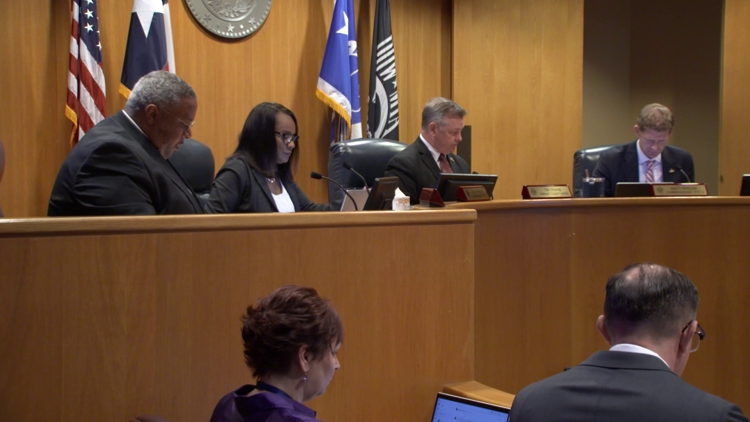
FORT WORTH, Texas — In a party-line vote, Tarrant County commissioners moved Wednesday to reshape their own precincts before the 2026 election cycle. The county will hire a conservative law firm to study its population and, potentially, draw a new election map. Republicans acknowledged they aim to cement their control of county politics, while Democrats allege "intentional racial discrimination.
" "It is appalling but not surprising that Judge Tim O'Hare, along with commissioners Matt Krause and Manny Ramirez, voted to retain legal counsel of a foundation with a well-documented history of overt hostility to minority voting rights," Commissioner Alisa Simmons, a Democrat, wrote in a statement. Commissioners have not redrawn their precinct boundaries since 2011. Since then, U.

S. Census data indicates the county population has grown by more than 300,000. According to 2020 U.
S. Census data, 525,020 people live in Precinct 1, 532,325 people live in Precinct 2, 521,942 people live in Precinct 3, and 531,353 people live in Precinct 4. A previous commissioners court opted against redistricting after the latest census.
A county-commissioned study determined the precincts remain even enough to meet federal requirements. During those discussions, then-Tarrant County Judge Glen Whitley noted the county's growth actually improved the 2011 map's population balance. Members of that court enjoyed friendly relationships with one another, Fort Worth Star-Telegram political analyst Bud Kennedy noted.
"Commissioners, at the time, felt like they were all getting along and they just didn't want to rock anyone's boat," he said. Four years later, none of those officials remain in public office. The new court's meetings are often contentious.
Against Democrats' objections Wednesday, the court's Republican majority moved to pay the Public Interest Legal Foundation (PILF) no more than $30,000 to oversee demographic research and make recommendations regarding the precincts' shape. O'Hare said he handpicked the firm. Other groups did not have an opportunity to apply for the work, irking Democrats who suggested the process was not sufficiently fair or transparent.
The PILF has repeatedly litigated provisions of the Voting Rights Act, often suing municipalities to purge voters from election rolls. The firm's president, J. Christian Adams, served on President Donald Trump's election integrity commission in 2017.
"How was PILF selected? Where did the recommendation come from?" Commissioner Roderick Miles, a Democrat, asked. Miles noted the county solicits applications for sprinkler maintenance, but chose not to open this work to a competitive bidding process. O'Hare promised the public will have an opportunity to weigh in on the new maps.
He said PILF will present their findings at one meeting and commissioners will vote on the proposals weeks later. Republicans have taken particular issue with precinct one's configuration. The district stretches from Benbrook to Euless, touching Parker, Johnson and Dallas counties.
"It's obvious to see that map is gerrymandered," said Mike Brewster, a Tarrant County GOP precinct chair. But a Republican-dominated court drew that boundary in 2011 to protect GOP candidates in neighboring Precinct 2, Tarrant County's only competitive precinct. The snake-like boundary siphons Black voters in eastern Fort Worth and southern Euless away from Precinct 2, which covers most of Arlington.
Republican Andy Nguyen, who served as O'Hare's chief-of-staff until January, held the Precinct 2 seat from 2011 to 2019. Arlington's demographics changed, Kennedy said, allowing Democrats to claim the seat in 2019 and retain it 2023. Simmons currently represents the Arlington-area district.
She and O'Hare often butt heads at commissioners' meetings. "If my colleagues support this firm, they are engaging in intentional discrimination against minority voters," she said before the vote. Ramirez, a Republican, noted he is the first Hispanic elected to the court.
He questioned how his voting influence would be diluted by further balancing the precincts' populations. Simmons warned the redistricting effort is likely to prompt costly lawsuits. She also questioned whether commissioners have the authority to redraw their maps mid-decade.
It's not clear when PILF will present its findings. Simmons, Ramirez and O'Hare are up for re-election in 2026. The entire county elects the Tarrant County Judge, meaning new precinct maps will not impact O'Hare.
.















